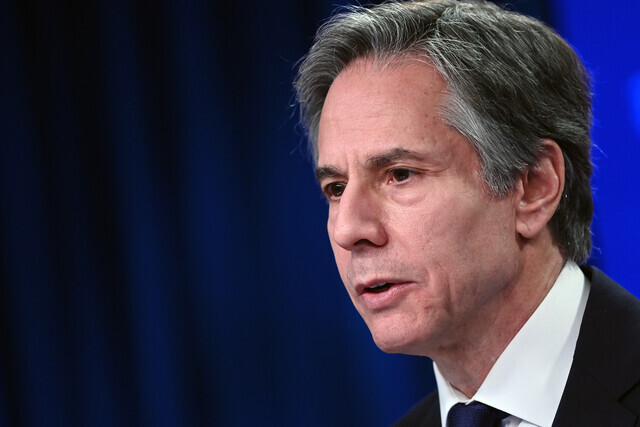hankyoreh
Links to other country sites 다른 나라 사이트 링크
[Editorial] It’s time for Seoul to consider N. Korean human rights issues

The US government has been underlining human rights issues as an essential element in its North Korea policy.
“Human rights will remain an indispensable component of our overall policy towards the North Korean government,” declared Lisa Peterson, the acting principal deputy assistant secretary of state in the Bureau of Democracy, Human Rights, and Labor, when the State Department’s 2020 Country Reports on Human Rights Practices were released on March 30.
“We will continue to hold the North Korean government accountable for its egregious human rights violations,” she added.
The North Korea-related content in this year’s human rights report is not much different from past years. It states that security forces are committing numerous human rights violations and that people are illegally or arbitrarily killed or disappeared by authorities.
But it carries different weight this time: unlike the Donald Trump administration, which was uninterested in matters of human rights and democracy, the Joe Biden administration has made it clear that it plans to assign human rights a central place in its diplomacy.
If we consider how sensitively North Korea responds to mention of human rights issues, this development is very likely to raise the barrier to resuming denuclearization talks between Pyongyang and Washington.
It’s certain to weigh heavily on the South Korean government, which has so far adhered to a position of pursuing natural improvements to North Korean human rights through denuclearization and inter-Korean exchange and cooperation, rather than addressing the issue head on.
On April 2, the directors of the South Korea, US and Japan national security councils were scheduled to meet in Washington for a final coordination of North Korea policy. Seoul needs to have a clear position and principles established on North Korean human rights before the direction of Seoul and Washington’s North Korean policy and diplomatic efforts can emerge.
South Korean conservatives have routinely pointed to human rights issues to oppose dialogue and cooperation with Pyongyang. Progressives, for their part, have prioritized denuclearization talks and inter-Korean reconciliation while consigning human rights issues to lower-priority status.
In response to the Biden administration’s emphasis on human rights, some have commented that North Korean human rights issues can’t be resolved through external pressure alone. The US has also faced accusations of hypocrisy for hoisting the banner of “human rights” while also invading Iraq and supporting dictatorial regimes in South America and elsewhere.
Still, the change in Washington’s stance is a reality. It’s time for Seoul to undertake its own concrete review of its principles for responding to North Korean human rights concerns.
Public sympathies on the issue of North Korean human rights need to be established not just in coordinating policies with the US but also within South Korean society in general.
We need to think more proactively about how we can contribute in a substantive way to improving North Korean human rights — and how we can be more inclusive of the defectors who have settled in South Korea since they represent a glimpse of the reunified Korea to come.
Please direct comments or questions to [english@hani.co.kr]

Editorial・opinion
![[Editorial] Penalties for airing allegations against Korea’s first lady endanger free press [Editorial] Penalties for airing allegations against Korea’s first lady endanger free press](https://flexible.img.hani.co.kr/flexible/normal/500/300/imgdb/original/2024/0502/1817146398095106.jpg) [Editorial] Penalties for airing allegations against Korea’s first lady endanger free press
[Editorial] Penalties for airing allegations against Korea’s first lady endanger free press![[Editorial] Yoon must halt procurement of SM-3 interceptor missiles [Editorial] Yoon must halt procurement of SM-3 interceptor missiles](https://flexible.img.hani.co.kr/flexible/normal/500/300/imgdb/child/2024/0501/17145495551605_1717145495195344.jpg) [Editorial] Yoon must halt procurement of SM-3 interceptor missiles
[Editorial] Yoon must halt procurement of SM-3 interceptor missiles- [Guest essay] Maybe Korea’s rapid population decline is an opportunity, not a crisis
- [Column] Can Yoon steer diplomacy with Russia, China back on track?
- [Column] Season 2 of special prosecutor probe may be coming to Korea soon
- [Column] Park Geun-hye déjà vu in Yoon Suk-yeol
- [Editorial] New weight of N. Korea’s nuclear threats makes dialogue all the more urgent
- [Guest essay] The real reason Korea’s new right wants to dub Rhee a founding father
- [Column] ‘Choson’: Is it time we start referring to N. Korea in its own terms?
- [Editorial] Japan’s rewriting of history with Korea has gone too far
Most viewed articles
- 160% of young Koreans see no need to have kids after marriage
- 2Presidential office warns of veto in response to opposition passing special counsel probe act
- 3[Editorial] Penalties for airing allegations against Korea’s first lady endanger free press
- 4Hybe-Ador dispute shines light on pervasive issues behind K-pop’s tidy facade
- 5S. Korea “monitoring developments” after report of secret Chinese police station in Seoul
- 6Months and months of overdue wages are pushing migrant workers in Korea into debt
- 7OECD upgrades Korea’s growth forecast from 2.2% to 2.6%
- 8Inside the law for a special counsel probe over a Korean Marine’s death
- 9Japan says it’s not pressuring Naver to sell Line, but Korean insiders say otherwise
- 10[Exclusive] Hanshin University deported 22 Uzbeks in manner that felt like abduction, students say